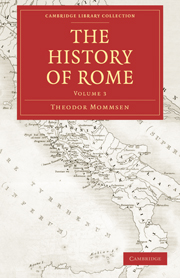Book contents
- Frontmatter
- PREFATORY NOTE
- Contents
- BOOK FOURTH: THE REVOLUTION
- CHAPTER I THE SUBJECT COUNTRIES DOWN TO THE TIMES OF THE GRACCHI
- CHAPTER II THE REFORM MOVEMENT AND TIBERIUS GRACCHUS
- CHAPTER III THE REVOLUTION AND GAIUS GRACCHUS
- CHAPTER IV THE RULE OF THE RESTORATION
- CHAPTER V THE PEOPLES OF THE NORTH
- CHAPTER VI THE ATTEMPT OF MARIUS AT REVOLUTION AND THE ATTEMPT OF DRUSUS AT REFORM
- CHAPTER VII THE REVOLT OF THE ITALIANS AND THE SULPICIAN REVOLUTION
- CHAPTER VIII THE EAST AND KING MITHRADATES
- CHAPTER IX CINNA AND SULLA
- CHAPTER X THE SULLAN CONSTITUTION
- CHAPTER XI THE COMMONWEALTH AND ITS ECONOMY
- CHAPTER XII NATIONALITY, RELIGION, AND EDUCATION
- CHAPTER XIII LITERATURE AND ART
- CORRECTIONS
CHAPTER VI - THE ATTEMPT OF MARIUS AT REVOLUTION AND THE ATTEMPT OF DRUSUS AT REFORM
Published online by Cambridge University Press: 05 October 2010
- Frontmatter
- PREFATORY NOTE
- Contents
- BOOK FOURTH: THE REVOLUTION
- CHAPTER I THE SUBJECT COUNTRIES DOWN TO THE TIMES OF THE GRACCHI
- CHAPTER II THE REFORM MOVEMENT AND TIBERIUS GRACCHUS
- CHAPTER III THE REVOLUTION AND GAIUS GRACCHUS
- CHAPTER IV THE RULE OF THE RESTORATION
- CHAPTER V THE PEOPLES OF THE NORTH
- CHAPTER VI THE ATTEMPT OF MARIUS AT REVOLUTION AND THE ATTEMPT OF DRUSUS AT REFORM
- CHAPTER VII THE REVOLT OF THE ITALIANS AND THE SULPICIAN REVOLUTION
- CHAPTER VIII THE EAST AND KING MITHRADATES
- CHAPTER IX CINNA AND SULLA
- CHAPTER X THE SULLAN CONSTITUTION
- CHAPTER XI THE COMMONWEALTH AND ITS ECONOMY
- CHAPTER XII NATIONALITY, RELIGION, AND EDUCATION
- CHAPTER XIII LITERATURE AND ART
- CORRECTIONS
Summary
Marius
Gaius Marius, the son of a poor day-labourer, was born in 599 at the village of Cereatæ then belonging to Arpinum, which afterwards obtained municipal rights as Cereatse Marianæ and still at the present day bears the name of “Marius’ Home” (Casamare). He was reared at the plough, in circumstances so mean that they seemed to preclude him from access even to the magistracies of Arpinum: he learned early—what he practised afterwards even when a general—to bear hunger and thirst, the heat of summer and the cold of winter, and to sleep on the hard ground. As soon as his age allowed him, he had entered the army, and in the severe school of the Spanish wars had rapidly raised himself to the position of an officer. In Scipio's Numantine war he, at that time twenty-three years of age, attracted the notice of the stern general by the neatness with which he kept his horse and his accoutrements, as well as by his bravery in combat and his propriety of demeanour in camp. He had returned home with honourable scars and warlike distinctions, and with the ardent wish to make himself a name in the career on which he had gloriously entered; but, as matters then stood, a man of even the highest merit could not attain those political offices, which alone led to the higher military posts, without wealth and without connections. The young officer acquired both by fortunate commercial speculations and by his union with a maiden of the ancient patrician gens of the Julii.
- Type
- Chapter
- Information
- The History of Rome , pp. 196 - 225Publisher: Cambridge University PressPrint publication year: 2010First published in: 1863



